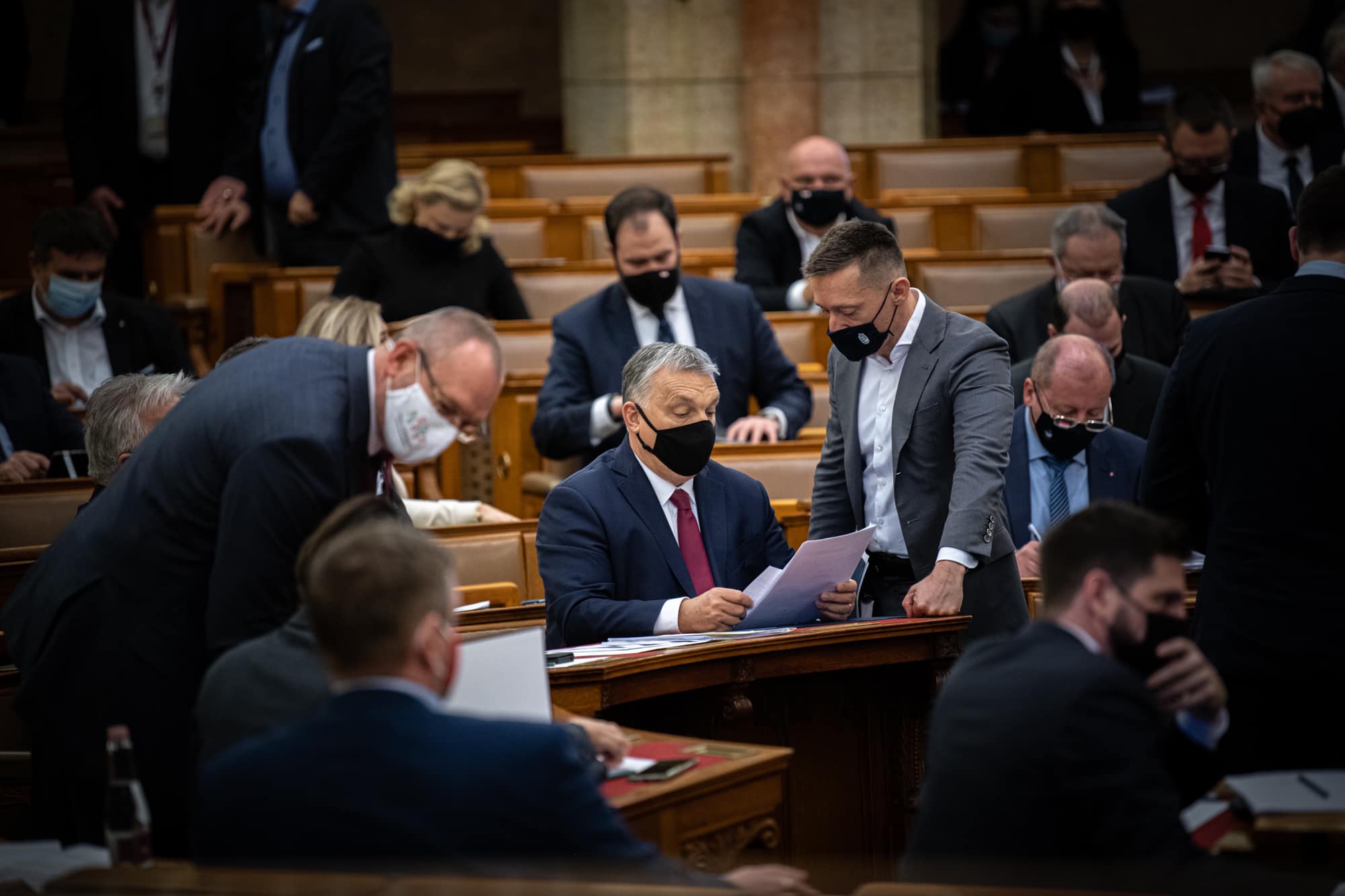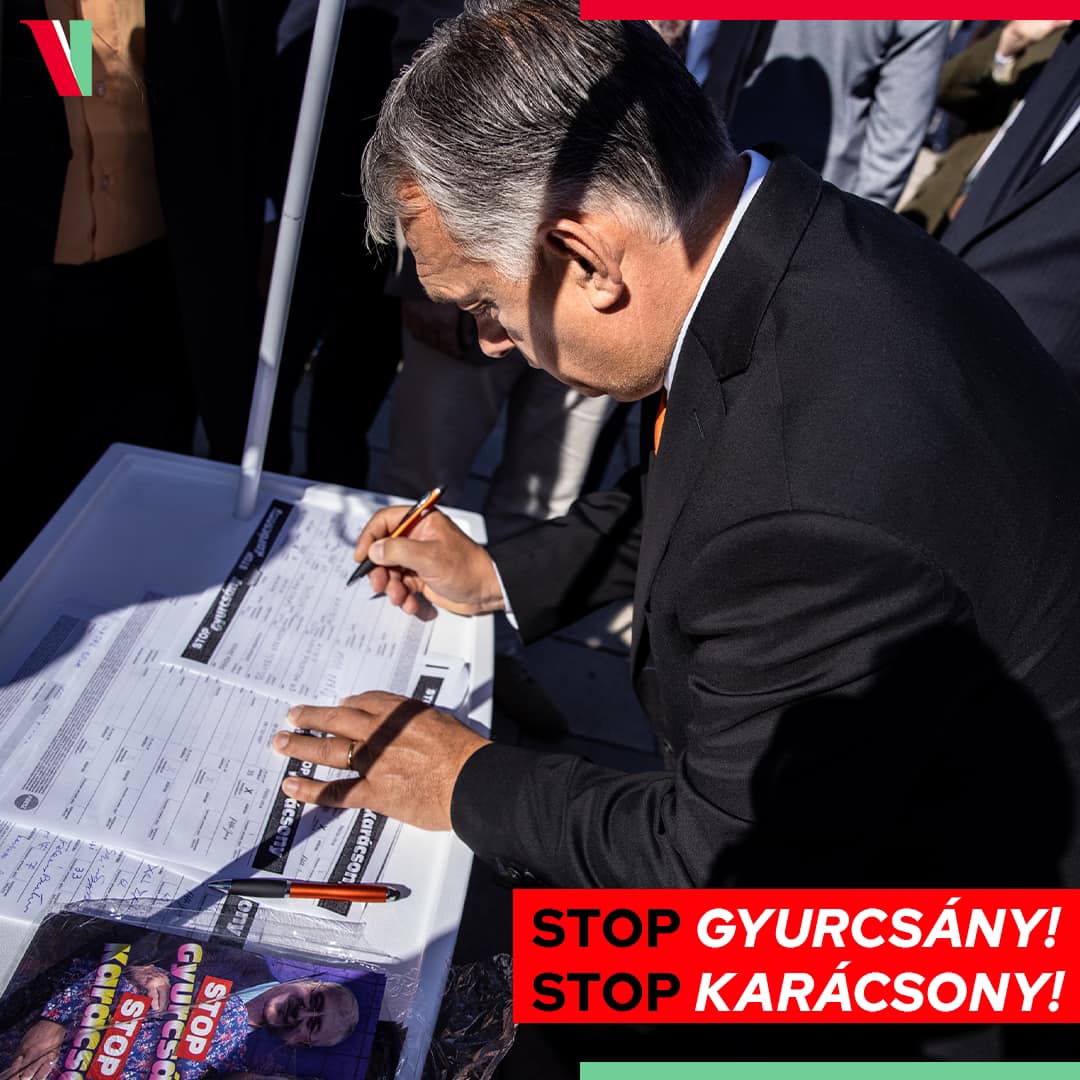Inside Orbán’s Fidesz party preparing for Hungary’s parliamentary election

For some time, PM Viktor Orbán has been receiving all government proposals on his desk with green, yellow, or red post-its. The colors of the traffic light system signal to the PM the political risks involved in individual decisions. The documents with the highest, red stickers are typically not signed by the PM.
The post-it system has been developed in parallel with the governing Fidesz party’s preparations for the parliamentary election. It serves the goal to avoid a government decision which could decrease Fidesz’s chance for a victory. The assessments based on the calculation of political risks have been done by Bence Tuzson, a close ally of and state secretary under minister Antal Rogán, who preliminarily reads all government materials and proposals.
This episode shows the special role Rogán, the head of the PM’s cabinet, and others close to him play in the election preparations. Despite fulfilling this role in the 2019 local government elections which ended with a worse than expected results for Fidesz, Rogán has been the unquestionable leader of the current election campaign.
The 2019 election did not damage Rogán’s reputation, however, it provided Fidesz with several important lessons learned. Drawing conclusions from the defeat of Fidesz-backed and incumbent mayor of Budapest István Tarlós, who had no Facebook presence, Fidesz learned that elections cannot be won without social media. Therefore, the party has started training its politicians on the proper use of Facebook. In parallel with this acknowledgment, the Megafon Center sponsoring the social media presence of government-close persons has been established.
Fidesz also concluded from the 2019 elections that Tarlós’s communication focusing on stressing the achievements alone cannot lead to victory. It confirmed the need for a strategy demonizing the enemy which Fidesz had already successfully mastered in previous parliamentary campaigns. Therefore, former PM and president of the Democratic Coalition opposition party Ferenc Gyurcsány has become the center of Fidesz’s negative campaign.
At the same time, Fidesz politicians have been concerned that a case similar to the 2019 sex scandal of Fidesz mayor of Győr Zsolt Borkai could break in the run-up to the election day that would damage Fidesz. In order to manage the impact of a potential public revelation of a homosexual government politician on the election outcome, the party has been trying to gain a significant lead over the opposition with various financial incentives to the voters.
Direkt36 spoke with more than a dozen of sources – government players and opposition politicians in contact with them – to understand the election strategy of Fidesz. They all agreed to discussions under the condition of anonymity.
We have sent several questions to the press chief of PM Orbán, Rogán’s ministry, as well as Fidesz but have not received responses.
The lost trust
The strategy of Fidesz for the 2019 local government elections was to keep as many opposition voters as possible at home. A boring campaign was in the interest of the party and therefore it did not approve a debate between incumbent Fidesz-backed mayor István Tarlós and his main opposition challenger Gergely Karácsony. This was also the reason for PM Orbán’s moderate role in the campaign. A few days before the elections, he still had time to travel to Rome and then Paris.
The campaign of Tarlós focused mainly on emphasizing his achievements. He did not have major campaign events and did not promote his largely inactive Facebook page for the campaign period either. He told Hungarian online news site Azonnali that he “did not like Facebook. With all its advantages for the next generations, anonymity and irresponsible internet communication also contains many risks.” In contrast, Karácsony had a robust online presence.
In the end, the only slightly visible campaign of Fidesz was disrupted by the publication of photos and videos on a blog which showed then Fidesz mayor of the town of Győr, Zsolt Borkai, and his friends having sex with young women on a yacht. The scandal had a significant impact on the lead campaign theme. It made it increasingly difficult for Fidesz politicians to keep talking about Karácsony’s unsuitability, according to a government-close source. During the campaign, Fidesz barely reacted to the scandal, which had the opposite effect to its previous campaign aim and mobilized opposition voters, while it increased uncertainty among its own electoral base.
Fidesz performed much worse in the October 2019 local government elections as it was previously anticipated by the party. “The degree of defeat of Tarlós and of the loss of Budapest districts came as a surprise,” a Fidesz politician said with regards to not only losing the position of the mayor but also several traditionally right-leaning election districts in the capital. In addition, Fidesz also lost important positions in the countryside, with the opposition taking over the leadership in several bigger towns.
In most cases, surveys by government-close think tanks Századvég and Nézőpont failed to predict these losses in advance. Both public and internal opinion polls calculated with better Fidesz results, and due to their inaccuracy many inside Fidesz felt resentment towards the political analysts. One of the leading staff in a government-close institute later complained to several opposition analysts about the criticism they received: “Again and again we need to earn the trust.” According to a Fidesz mayor, due to the inaccurate results provided by these think tanks his local municipality has been working for a while now with Medián, an independent public opinion pollster where “feelings do not have an impact on the reality.”
We were not good enough
Although the 2019 campaign was the first one after 10 years which did not have the outcome desired by Fidesz, party members did not consider it a serious tragedy. According to a source who has regular conversations with leading Fidesz politicians, the ruling party rather had the impression that they simply “were not good enough.” Several lessons were learned however from the 2019 campaign; in particular lessons about the usage of social media and the importance of a negative campaign. These had become the foundations in their preparation for the current parliamentary elections, which they have already started in 2020.
In this process the head of the PM’s cabinet Antal Rogán continues to play the key role as his reputation has not been damaged by the 2019 campaign. According to a government official Rogán’s position has even strengthened because of the unsuccessful campaign of Tarlós, who tried to distance himself from Fidesz’s campaign staff. Another source in contact with leading Fidesz politicians said that Rogán likes “doing everything himself” and stays late into the night in his office. The government official added that even if not all campaign ideas come directly from him, he effectively oversees their implementation.

Orbán and Rogán, Source: Facebook page of Orbán
Rogán relies to a great extent on András Gyürk, with whom they started their career together in Fidelitas, the youth organization of Fidesz, and who officially managed multiple parliamentary and European Parliamentary election campaigns in the past. The different researches and surveys for Rogán are overseen by Gábor Fűrész, leader of the most government-affiliated think tank Századvég. Fűrész is also a member of a Hungarian rock-band called Magashegyi Underground, he also used to be a shareholder in an important government-close pollster company Kód Ltd., and was also the co-owner of one of the Századvég-companies together with Kristóf Szalay-Bobrovniczky, the former business partner of Árpád Habony, chief advisor of PM Orbán. In summer of 2021 he became chief of the board of trustees of Századvég Foundation.
We sent several questions to Századvég-group regarding the activities of Gábor Fűrész. In their response Századvég Foundation stated it had no contracts with Fidesz and Fűrész held no position in the party.
Fidesz and the social media
Rogán and his staff learned many lessons from the 2019 elections, partly from feedback collected from regional Fidesz organizations.
It became obvious to the Rogán team that social media was not fully utilized in the 2019 campaign. Following the 2019 elections a joint research by a communications agency and a market analyst company showed that Facebook played a crucial role during the campaign. According to this research:
- In the Budapest districts turned by the opposition from Fidesz the opposition candidates were more active on Facebook,
- Gergely Karácsony, who became the mayor of Budapest, efficiently managed his social media presence, while his opponent István Tarlós did not even have his own social media page,
- Even the Facebook page of Fidesz contained only 11 posts altogether that encouraged people to vote for Tarlós.
Fidesz drew similar conclusions; according to a government-close source they believe that “the 2022 elections will be decided on Facebook.” The pollsters working for Fidesz already surveyed that Facebook was the primary source of information for 30 percent of the people. Since then this rate, mostly due to the coronavirus pandemic, increased close to 60 percent.

Source: Facebook page of Orbán
Therefore, in the last couple of years Fidesz politicians have started learning how they could use Facebook more professionally. Foreign minister Péter Szijjártó, who is currently one of the most active Fidesz politicians in social media, earlier spoke about how he was reluctant to have his own Facebook page. It was Rogán who first suggested it to him, and after further hesitation, PM Orbán also raised it with him in the beginning of 2020. Others have also become more active on social media – during the pandemic, PM Orbán announced the most important government decisions in Facebook videos posted on his page. Finally, in May 2020 the Megafon Center was founded with the aim to amplify pro-government ideas and opinions through financing Facebook posts of pro-government figures.
Toughness and Gyurcsány
A couple of months after Megafon was established Fidesz took another important step in preparation for 2022. PM Orbán published an opinion piece about the upcoming elections in the government-affiliated daily Magyar Nemzet in September 2020. Among others he wrote: “There is no point in deluding ourselves: the global elite will perform the same strategy during the elections in Hungary in 2022. Their tool is the left-wing that has fallen many times before, and their leader, Ferenc Gyurcsány…”
In this piece, Orbán described the strategy Fidesz has since taken on against the opposition. The core of this approach is the central message that with the strongest opposition party being the Democratic Coalition (DK), the opposition’s true leader is its party president and former controversial PM Ferenc Gyurcsány. Gyurcsány has been put into the spotlight because Fidesz staff saw in opinion polls that highlighting his figure could turn away centrist and right-leaning voters from the opposition.
Tarlós’s disappointing performance in 2019 was also a confirmation to Fidesz strategists that no election can be won by only highlighting successes and achievements. As a government-close source put it: “We also need a confrontational campaign that chooses an enemy who represents a threat.”
Even the opposition politicians felt that Fidesz would lead an aggressive election campaign. The ruling party heavily attacked Budapest mayor Karácsony for the municipality’s COVID-19 response already in spring 2020, but one Fidesz politician in Budapest told an opposition politician that more severe confrontation was awaiting the mayor. “We are constantly being pushed for not being harder on him,” he said. Fidesz wanted to increase pressure on Karácsony because it believed he was the biggest threat to Fidesz as the leader of the opposition.
The digitalized Kubatov-list
The first time this strategy based on social media communications and focus on a negative campaign was used by Fidesz in spring 2021 when Gergely Karácsony announced his prime ministerial candidacy during the opposition’s primaries in mid-May 2021. On the day of his announcement Facebook and Youtube were flooded by Fidesz-sponsored videos about Karácsony being in reality Gyurcsány’s puppet. The role of Megafon also became clear at that point; in the next couple of months it has gradually become one of the largest domestic political advertisers, spending more than 1.3 million euros altogether on amplifying pro-government messages in Facebook advertisements last year.
The timing of Fidesz’s “Stop Gyurcsány! Stop Karácsony!” petition last September was not coincidental either. Party leaders claimed that they only wanted to remind voters that people who previously “destroyed this country” wanted to gain power once again, but in reality the signature drive served a more important purpose.

Orbán signs the “Stop Gyurcsány” petition, Source: Facebook page of Orbán
Fidesz wanted to update the database dubbed the “Kubatov-list,” named after Fidesz’s party director Gábor Kubatov, which contained the names of Fidesz sympathizers. Possessing an up-to-date database with their own voters has been a central element of Fidesz’s election strategy for a long time now, so when the election day comes Fidesz activists are aware who they can seek out to mobilize for voting. “There is a huge belief in the management of Fidesz that in the end, that is all that matters. On the day of the elections you have to stand there in the door, until you convince citizens to go to vote,” a government official said. He added that the party puts a lot of energy into updating the list and this year Fidesz activists will follow on tablets which doors there are still to knock on and just like food couriers they would “always just receive the next name and address.”
Fidesz seizes the opportunity
Despite Fidesz’s preparations, the opposition primaries did not go smoothly for the party. For one opposition analyst, a sign of uncertainty within Fidesz was when his inquiries were met with silence, even though earlier he had no problems reaching his government-close contacts. Fidesz contacts later explained this by saying they were busy with conducting an enormous amount of surveys, and these showed an opposition advantage during the primaries.
Moreover, contrary to Fidesz expectations, Péter Márki-Zay, mayor of a small town of Hódmezővásárhely, and not Budapest mayor Gergely Karácsony won the opposition primaries and became the joint opposition prime ministerial candidate. “This caught us by surprise,” a Fidesz politician said, and added that the communication strategy of Fidesz had therefore focused on Karácsony’s presumed victory.
The so-called “City Hall case” – a series of questionably sourced media reports centering around leaks alleging wrongdoings in the Budapest City Hall – also fitted into these expectations and according to a Fidesz politician “it was made up to be used against Karácsony as the prime ministerial candidate.” The source added that despite the different outcome of the opposition primaries Fidesz decided to “seize this opportunity” as the case was already prepared.
The most important allegations in the case included claims that Karácsony’s circles had a secret plan to sell the Budapest City Hall building (with the involvement of former Socialist Prime Minister Gordon Bajnai) and that corruption was involved in other purchases by the municipality.
The story was first published by Hungarian online news outlet Index in November 2021. It was believed in Fidesz leadership that Index was responsible for its losses in the 2019 local elections by keeping the sex scandal story of now former mayor of Győr Zsolt Borkai on the public agenda. In early 2020, Index was purchased by a government-close businessman and following the ownership change Index reduced the number of government-critical stories but it has not become such a harsh propaganda site as other pro-government outlets. Former editor of the news site’s political column Balázs Gabay who resigned last November stated in a Facebook post that the government was behind the story and “in this case, Index only served as a platform for someone who used it to politically attack their opponents.”
Karácsony denied the allegations and the municipality even set up an investigative committee, but the fact that he was forced to keep explaining himself because of a case that he said never even happened showed how effective the government’s campaign was.
The energized Orbán
In the meantime, Fidesz had to adapt its communication strategy to the unexpected victory of Péter Márki-Zay. Since then, despite Márki-Zay calling himself a conservative and harshly criticizing Gyurcsány during the primaries, Fidesz has portrayed him as a leftist politician with connections to the former PM and president of Democratic Coalition opposition party. For this, they used statements by Márki-Zay on Fidesz’s favorite topics – migration and utility cost reduction – as well as his other controversial statements.
And he has made several of them, for instance calling pro-government journalists “retarded,” or when he talked about Jews in Fidesz. “We utilize and schematize his mistakes smartly,” a Fidesz politician said when he described how they take out sentences from Márki-Zay’s long Facebook videos to be used against him afterwards.
This reactive strategy consisting of only monitoring Márki-Zay’s statements and then responding to them was criticized by many within the ruling party. One of the sources explained this with Fidesz lacking a clear campaign topic this time, as it used to be with the theme of utility cost reduction in 2014 or migration following 2015. In addition, they have not yet found any information that could be used against Márki-Zay personally, therefore according to a government-close source there might be no “smear-campaign” against him either.
Nevertheless, there is no serious concern within Fidesz. Internal party polls from February showed they had a 10 percentage lead over the united opposition. Surveys of independent pollster Medián also confirmed public support for the ruling party has increased; while the two blocks were polling neck and neck at 37-37 percent last October, this changed to 39-34 percent to the advantage of Fidesz in December. A government-close source added that the increase in Fidesz’s popularity rate in the beginning of this year is also remarkable because based on trends from previous election campaigns the party’s support either decreased or stagnated between December and the election day.
Fidesz’s own polls show that the party recently improved even in the capital of Budapest, which is considered an opposition stronghold where Fidesz candidates were likely to face an uphill battle. While so far they believed that they could lose all individual constituencies in Budapest, by the beginning of 2022 they started perceiving an advantage, typically in districts led by Fidesz mayors.
Fidesz is also satisfied with the popularity of PM Orbán. Party surveys show that Orbán has a plus five percentage support, which means that there are five percent more people who support the PM than those who do not. According to the government-close source Orbán won elections even with a minus five percentage support. This was also confirmed by another source who added that elections energized Orbán – he is excited about being engaged in an election battle and likes to call individual Fidesz candidates personally to motivate them with survey data.
Fidesz is in a good position not only because of negative campaigns such as the City Hall case but also thanks to the possibility of positive messaging. Since last year, the government has gone on a pre-election spending spree and PM Orbán has regularly announced various tax allowances, pension and salary increases, as well as price caps on his social media. According to one government-close source posting positive content about family, countryside visits, and government spendings on the PM’s Facebook page is part of a conscious campaign strategy.


Orbán attends a pig slaughter, Source: Facebook page of Orbán
As part of being positive, PM Orbán announced in December 2021 that Fidesz decided to nominate minister for family affairs Katalin Novák for the position of President of Republic. According to sources with internal knowledge, Orbán was considering two different scenarios for the nomination. In case of a potential election loss, Fidesz would need a tough and resilient personality as head of the state, and the names of parliamentary speaker László Kövér, former minister János Lázár, and deputy prime minister Zsolt Semjén came up. The other scenario was based on election victory and in this case a nominee projecting a positive image was preferred, such as Katalin Novák. In the end, Orbán went with the second option and chose Novák, also because Fidesz polls showed opposition PM candidate Márki-Zay was less popular among female voters.
Fidesz now expects that even if there is another embarrassing scandal similar to the Borkai case, the advantage it has managed to gain so far would be enough to preserve its lead and win the elections. According to a source there are some concerns inside the party about breaking a story involving a homosexual Fidesz member during the campaign, but Fidesz has gathered enough ammunition to strike back in this case too. As an example mentioned by two Fidesz-close people, when the opposition started picking up the story of how Rogán’s cabinet chief allegedly cheated on his law school exams, a few days later it was revealed that a politician from the opposition Socialist Party lied about her university degree.
Szabolcs Panyi, András Pethő, and Zsuzsanna Wirth contributed to this story.
Cover picture: szarvas / Telex


